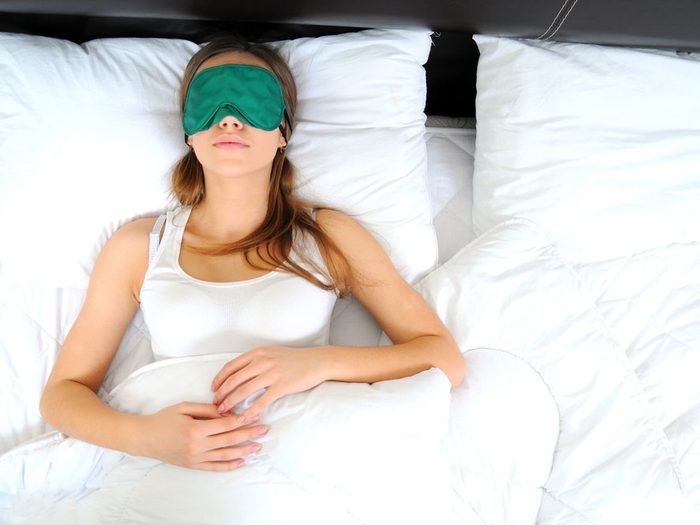
Common causes of insomnia
For Jenny Smith*, her insomnia started when her daughters were young. “I don’t know if I ever had more than a three-hour stretch,” recalls the 54-year-old Toronto speech-language pathologist. “Our youngest daughter came into our room regularly in the middle of the night until she was 10.”
These days, a different family member is keeping her awake: “My husband has sleep apnea and snores, and it bothers me when I’m going to sleep or when I wake up at night.” Smith usually clocks only 61/2 hours of sleep each night, and she pays for it by feeling zonked the next day. “I drive a lot to see clients and I get really tired after lunch,” she says. “Sometimes I have to pull over in a gas station parking lot to take a 15-minute power nap.”
Like Smith, many women just aren’t getting the sleep they need to feel rested. “Women are much more likely to have sleep problems than men,” says Dr. Meir Kryger, a Canadian physician and professor of medicine at the Yale School of Medicine in New Haven, CT. “A large part of it is due to reproductive hormones and stage of life; even in this day and age, it’s usually the woman who ends up taking care of kids or aging family members in the night.” Women are also more likely to have depression and anxiety, which are linked to sleep disorders.
Insomnia – difficulty falling asleep or getting back to sleep or the inability to stay asleep – is the most common sleep disorder for women. It affects about 40 percent of the general population in Canada, and women are 11/2 times more likely to experience it than men, according to a Canadian survey published in The Canadian Journal of Psychiatry.
Not catching enough zzzs can have serious health consequences. Poor sleep has been linked to diabetes, cancer and heart disease and makes you more prone to weight gain by affecting the hormones that control hunger and satiety. It can hurt your mental health, too. “Besides making you irritable, sleep deprivation increases your likelihood of developing depression,” says Dr. Kryger.
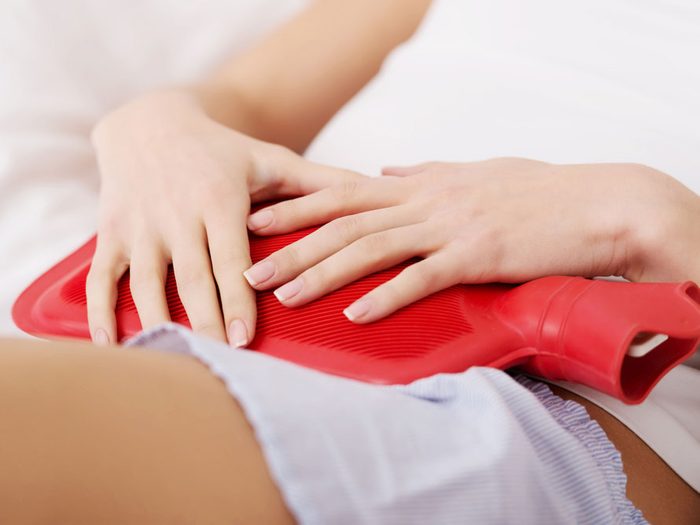
Fluctuating hormone levels
Women sleep best during the first two weeks of their menstrual cycles, when estrogen levels rise, explains Dr. Kryger in his e-book The iGuide to Sleep. From mid-cycle ovulation to menstruation, fluctuating hormone levels can cause sleepless nights, where it takes longer to fall asleep and sleep quality plummets. PMS and cramps before or during menstruation can also lead to poor sleep.
Thanks to hormonal changes, insomnia is more common in middle age. Forty percent or more of menopausal and post-menopausal women have sleep problems in North America, says Dr. Kryger. Hot flashes are often to blame. “A lot of people try hormone replacement and that quickly improves sleep,” says Dr. Norah Vincent, a psychologist and professor of clinical health psychology at the University of Manitoba. “Some data show that you can lessen hot flashes with relaxation training, so you might be able to do something without taking any medication at all.”
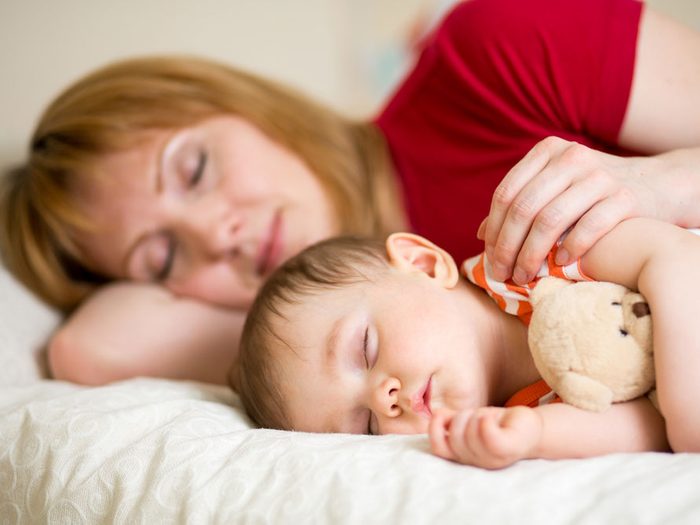
Your kids
Sleep deprivation is a big problem for new moms waking up with young babies, but it affects parents of kids of all ages. According to a survey by the Vanier Institute of the Family, people with children under the age of 15 sleep 17 minutes less than their childless counterparts, while those with two kids sleep 25 minutes less. Being awoken when Junior has a bad dream isn’t the only issue. “One of the interesting things we see with a lot of women is that they deliberately restrict sleep and stay up later or get up earlier because that’s the only time they have to themselves,” says Dr. Vincent. “It’s a female phenomenon.” To get time on your own without sacrificing sleep, she suggests talking to your spouse about scheduling your day differently so you can get a little more time to yourself.
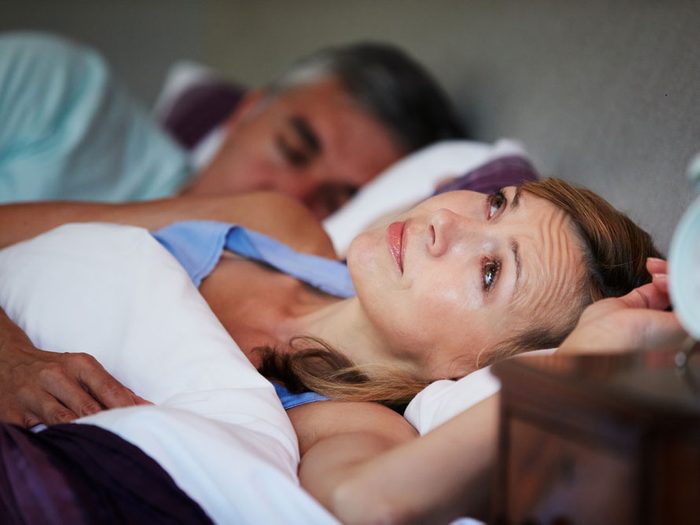
A racing mind
When you’re wired from the stresses of the day, it can be difficult to sleep. And women are more prone to ruminating: We pay more attention to how we’re feeling and what’s bothering us, says Dr. Helen Driver, a somnologist at Queen’s University in Kingston, ON, and past president of the Canadian Sleep Society. Thinking about her giant to-do list keeps Yasmine McLean up at night. “Sometimes it’s one or two specific items if I have a big day ahead,” says the 37-year-old Ottawa sales manager, “but depending on my mood or stress level, things that aren’t relevant or timely get added to the mix, too, which doesn’t help with sleep.” Getting up and writing it down usually helps. “Then you’re not obsessing while lying in bed and you’re being proactive,” says Dr. Driver. It works for McLean. “I’ll do a brain dump and write down as much as I can so that I feel a sense of order and haven’t forgotten anything.”
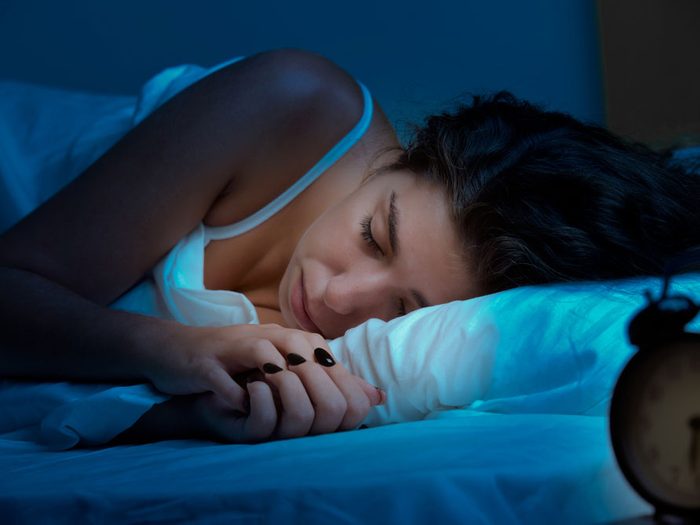
Your electronic devices
Responding to emails, checking your Facebook newsfeed and looking at your iPad close to bedtime can interfere with your ability to fall asleep. According to a 2014 study of women at Brigham and Women’s Hospital, the blue light from electronic devices interrupts your body’s natural circadian rhythms, so it takes longer to fall asleep and makes you less alert the next day. The type of material you’re viewing could also be keeping you up. For example, you may get worked up after reading an email with a last-minute meeting request from your boss or watching an adrenalin-fuelled film. Experts recommend banning all technology, including TV, from your bedroom.
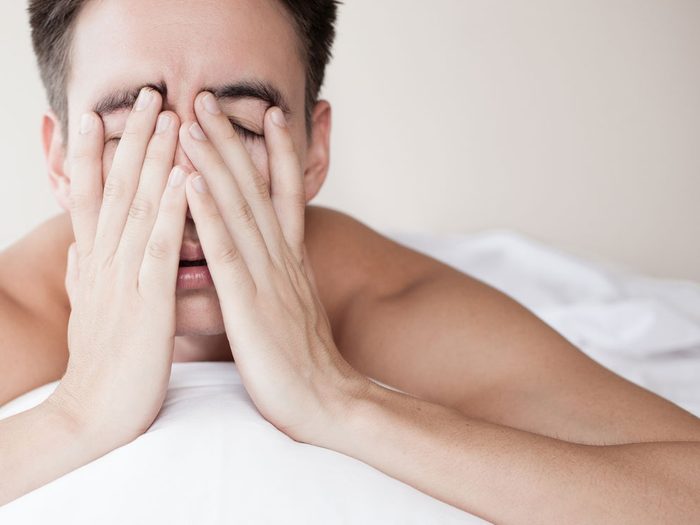
Jittery legs
Restless legs syndrome (RLS), which causes uncomfortable leg sensations that make you move your legs, affects about one in 10 people and twice as many women as men. The condition has made life difficult for Jane Peters*, a 53-year-old Toronto lawyer. “Because my legs were always moving, I never got a deep sleep,” she says. “My doctor said it was like I was running a marathon every night.” Peters had problems waking up, arriving late at work and feeling sleepy throughout the day. “I’d have to put my head on my desk after lunch.”
Heavy periods, which cause you to lose a lot of iron, can contribute to RLS, so it can sometimes be corrected with iron supplements. Medications are also available to treat the condition. “But these are serious medications, so people don’t usually take them unless RLS is really interfering with their lives,” says Dr. Driver.

A restless bedmate
If your partner has a sleep problem, such as snoring or twitching, then you’ll have one, too. “It’s like second-hand smoke: It’s a second-hand sleep disorder,” says Dr. Kryger. Getting your partner to see a doctor to help deal with a sleep issue is essential. Using white noise in the bedroom to mask snoring sounds or a body pillow to help your partner sleep on his side can also make a difference. But if the problem worsens or you still can’t get to sleep, separate beds or bedrooms may be worth a try.
For many families, pets are also big sleep disrupters. If Fido sleeps on the bed – or even in the same room – and snores, twitches or scratches during the night, he could be disrupting your rest. Most experts recommend booting cats and dogs from the bedroom.
